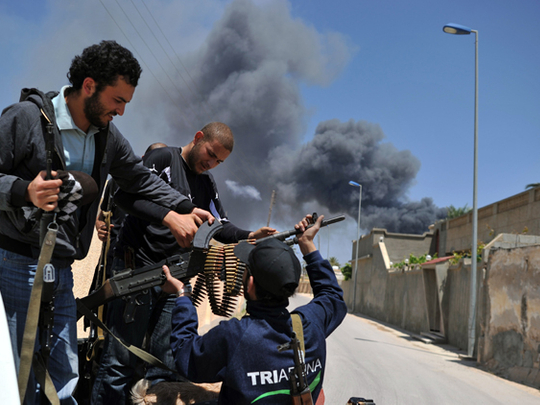
Tripoli: Libyan leader Muammar Gaddafi struck a conciliatory note on Saturday, saying he was ready for a ceasefire and negotiations provided Nato "stop its planes".
In a live speech on Libyan television that began in the early hours of Saturday morning and lasted 80 minutes, Gaddafi said he did not intend to step down or leave the country and that Libyans could solve their own problems if Nato strikes end.
"[Libya] is ready until now to enter a ceasefire ... but a ceasefire cannot be from one side," said Gaddafi, speaking from behind a desk and aided by reams of papers covered in what appeared to be hand-written notes.
"We were the first to welcome a ceasefire and we were the first to accept a ceasefire ... but the Crusader Nato attack has not stopped," he said. "The gate to peace is open."
Poorly armed and trained rebel groups have been fighting since mid-February to end Gaddafi's 41-year rule. Nato forces say a United Nations resolution allows them to attack government positions to protect civilians; but the support has not brought the swift fall of Gaddafi some expected.
Gaddafi said the Nato airstrikes and naval patrols went beyond the United Nations mandate and urged Russia, China and friendly African and Latin American countries to press the Security Council to take a fresh look at the resolution.
Gaddafi said the strikes and sanctions were affecting civilians and were destroying the country's infrastructure.
In a marked contrast to previous speeches, where he called the rebels "rats" and promised to track the down house by house, Gaddafi urged the rebels to lay down their weapons and said Libyans should not be fighting each other.
He blamed the rebellion on mercenaries and foreigners. "We cannot fight each other," he said. "We are one family."
Gaddafi denied mass attacks on civilians and challenged Nato to find him 1,000 people who had been killed in the conflict.
"We did not attack them or cross the sea ... why are they attacking us?" asked Gaddafi, referring to European countries involved in the air strikes. "Let us negotiate with you, the countries that attack us. Let us negotiate."
If Nato powers were not interested in talks, however, the Libyan people would not surrender and were willing to die resisting what he called its "terrorist" attacks. He warned Nato that its forces would die if it invaded by land.
"Either freedom or death. No surrender. No fear. No departure," he said.
'I am not leaving'
Speaking three months after former Tunisian President Zine Al Abidine Ben Ali fled the North African country after weeks of protests, Gaddafi said no one had the right to force him out.
"I'm not leaving my country," he said. "No one can force me to leave my country and no one can tell me not to fight for my country."
After the broadcast, state television said Nato warplanes had bombed a site in the Libyan capital Tripoli next to the television building during Gaddafi's address.
"A building adjacent to the Jamahiriya building was bombed during the broadcast of Muammar Gaddafi's speech and that implies a target on the leader of the revolution himself," the television said after Gaddafi had finished speaking.
Tunisia rebukes Libya
A battle between Libyan troops and rebels spilled over the western border into Tunisia Friday, drawing a sharp rebuke of Gaddafi's regime from the neighbouring government.
Clashes along the Tunisian border have escalated since Thursday, posing a new challenge for Gaddafi within the western half of the country where he must consolidate his control to cling to power. Rebels captured most of the east early on in the uprising against Gaddafi that began in February.
On the other major front in western Libya, Nato foiled attempts by regime loyalists to close the only access route to the besieged rebel city of Misrata, intercepting boats that were laying anti-ship mines in the waters around the port. The port is the only lifeline for the city of 300,000, which has been under siege for two months.
The government offensive on the Tunisian border along with shelling that killed 15 in Misrata on Friday and the attempt to mine the Misrata port show the regime is redoubling efforts to crush stubborn pockets of resistance in the west.
In the capital Tripoli, residents reported rising tensions over fuel shortages, a result of international sanctions imposed on Gaddafi. Witnesses said there have been clashes between residents and troops, including with stones and tear gas, at gas stations in recent days, after security forces tried to cut into huge lines.
In another indication of shortages, the government sent text messages to mobile phones of armed supporters, urging them to stop firing in the air in order to save ammunition for "our crusader enemies", said two city residents who spoke on condition of anonymity for fear of reprisals.
Gaddafi has clamped down hard on dissent in the capital. Shooting is heard frequently in Tripoli, some of the volleys fired in the air in pro-Gaddafi rallies. However, opposition figures say there have also been sneak nighttime shooting attacks on army checkpoints in the city.












